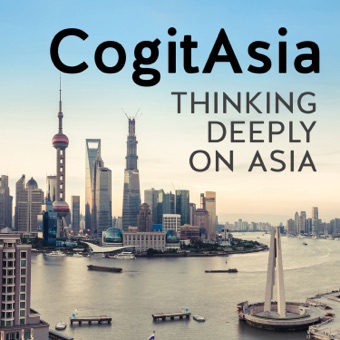
CogitAsia
CSIS Asia Program
A weekly podcast from the Asia experts at the Center for Strategic and International Studies, who provide analysis on policy and trends in the region.
- 17 minutes 58 secondsBuilding Bihar
In this episode, we focus on the Indian state of Bihar. Deputy Chief Minister of Bihar Sushil Modi – a key leader in the BJP – and Sanjay Kumar, Principal Secretary of Health for Bihar – the state’s head technocrat in the health field – sat down with Richard Rossow, holder of the CSIS Wadhwani Chair in U.S.-India Policy Studies, to discuss Bihar’s development progress, future priorities, and opportunities for engagement with the United States to benefit Biharis.
Hosted by Liza Keller. Audio edited by Ribka Gemilangsari. Written and produced by Jeffrey Bean.
Visit CSIS’s Engaging India’s States site.
Read Dr. Kartikeya Singh’s piece, Bihar Political Shakeup is a Win for BJP & JDU, CogitAsia.
Sign up for the India’s States Weekly newsletter.
Video on Demand for the CSIS Global Health Program’s event “Innovation, Partnership, and Self-Reliance: Health Policy Lessons from India’s Bihar State.”
22 January 2019, 3:15 pm - 30 minutes 49 secondsBalancing U.S.-India Energy Ties
In this episode, we discuss energy cooperation in the U.S.-India relationship. Achieving two diverging goals for energy engagement in the relationship – deepening and broadening renewables cooperation while India is importing U.S. oil and gas – will likely require a balancing act.
Joining the pod from our Wadhwani Chair in U.S.-India Policy Studies team to explain the progress in energy cooperation and coming opportunities as well as hurdles are Raymond Vickery and Dr. Kartikeya Singh. Ray and Kartikeya explain how the energy landscape in the relationship has changed, describe the Trump administration’s geopolitical challenge in addressing India’s significant imports of Iranian oil, examine the expansion in sub-national cooperation between U.S. and Indian states, and analyze the legacy of the U.S.-India Civil Nuclear Agreement. Aman Thakker, research associate with the Wadhwani Chair, recently sat down with Ray and Kartikeya to get their insights.
Hosted by Liza Keller. Audio edited by Ribka Gemilangsari. Written by Jeffrey Bean and Aman Thakker. Produced by Jeffrey Bean.
To learn more: See the recent CSIS policy brief on Key Energy Access needs in India by Dr. Kartikeya Singh, here.
Read an op-ed summarizing his recent remarks at the World Energy Policy Summit by Raymond Vickery, here.
1 November 2018, 4:45 pm - 20 minutes 32 secondsChina’s Credit & Credibility
In this episode, we discuss the current state of China’s financial system. China’s credit sector has expanded dramatically over the course of China’s unparalleled economic rise, yet now faces key problems that may impact overall economic stability. The authors of a new report from CSIS and the Rhodium Group, Logan Wright and Daniel Rosen, join the podcast to talk about their fresh analysis of China’s financial situation and explain the methodology behind their research. They also touch on the challenges to Beijing in moving forward with financial reforms while attempting to maintain stability in China’s credit system and explain what this potential area of weakness in China’s economy means for U.S. policy.
Logan and Dan recently caught up with CSIS Freeman Chair in China Studies Deputy Director Dr. Scott Kennedy to share these details and more on Credit and Credibility: Risks to China’s Economic Resilience. Hosted by Liza Keller. Audio edited by Ribka Gemilangsari. Written and produced by Jeffrey Bean.To learn more:
Read Logan Wright and Daniel Rosen’s report Credit and Credibility: Risks to China’s Economic Resilience.
Watch the public event and presentation video on demand here.
Review Logan Wright and Daniel Rosen’s commentary essay here.
See Daniel Rosen and Bei Bei Bao’s report Broken Abacus? A More Accurate Gauge of China’s Economy.
12 October 2018, 2:45 pm - 14 minutes 37 secondsSpotlight on Nagaland Post-Insurgency
In this episode, we discuss conflict resolution and development in the northeast Indian state of Nagaland. The long-running insurgency in Nagaland looks to be drawing to a close following conclusion of a framework for a peace agreement in 2015 between the government of India and the Naga rebels, but a final peace deal is still pending. For Nagaland's state government, the challenge for the future is solidifying good governance that will translate to development.
Joining the pod to provide an update on the peace process, state politics, and efforts to increase infrastructure and investment in Nagaland is Mr. Abu Metha. Mr. Metha is a journalist and political organizer who serves as the General Secretary of the Nationalist Democratic Progressive Party in Nagaland. He recently sat down with CSIS Wadhwani Chair Research Associate Aman Thakker to share his insights on the current status of Nagaland.
Audio edited by Ribka Gemilangsari. Written by Jeffrey Bean and Aman Thakker. Produced by Jeffrey Bean.
To learn more:
Prime Minister Narendra Modi’s speech in 2015 on the historic framework agreement.
Dialogues across Fault Lines of Territory and Peoples: Bridging State, Nation and Ethnicity in North East South Asia Forum for Human Rights & Heinrich Böll Foundation, 2016.
The Naga Peace Accord: Why Now? Dr. Namrata Goswami, Institute for Defence Studies & Analyses, August 2015.
27 September 2018, 9:30 pm - 29 minutes 56 secondsUnpacking Congress’s Role in Asia Policy & the 2019 NDAA
In this episode, we review the Asia-related sections of the 2019 National Defense Authorization Act, or NDAA, and explore Congress’s role in framing U.S. policy toward Asia. Returning to the podcast to unpack these topics are Dr. Michael Green, Japan Chair and Senior Vice President for Asia at CSIS, and Gregory Poling, director of the Asia Maritime Transparency Initiative and fellow with Southeast Asia Program at CSIS.
Mike and Greg share personal anecdotes about recently deceased Senator John McCain’s contributions on Asia policy and analyze the Asia elements of 2019 NDAA – including: language intended to restrain the Trump administration from rapid policy swings on South Korea and Taiwan, the requirement for the administration to provide a whole of government strategy for competition with China, and the funds allocated for boosting capacity of partner claimants in the South China Sea. They also discuss the bipartisan nature of congressional input to Asia policy, the value of congressional requirements for the Pentagon, and review crucial historical decisions made by Congress on Asia strategy. Hosted by Liza Keller. Audio edited by Ribka Gemilangsari. Written and produced by Jeffrey Bean.
To learn more:
See the John S. McCain National Defense Authorization Act for Fiscal Year 2019.
Dr. Michael Green’s book By More Than Providence Grand Strategy and American Power in the Asia Pacific Since 1783.
Gregory Poling’s recent op-ed, “Congress Fires a Warning Shot to China with Defense Budget,” in The Hill.5 September 2018, 5:15 pm - 41 minutes 45 secondsHow China Became an Insider in Global Governance
In this episode, we assess China’s engagement with multilateral institutions and global governance. Joining the show to track China’s transition from institutional outsider to cautious observer to international insider in global governance are Dr. Scott Kennedy, Deputy Director of the CSIS Freeman Chair in China Studies, and Dr. Stewart Patrick, James H. Binger Senior Fellow in Global Governance at the Council on Foreign Relations. Scott and Stewart also assess the health of the international order and sovereignty, examine China’s efforts to participate in and shape global governance, and evaluate where the United States stands in a period of declining internationalism.
Hosted by Liza Keller. Audio edited by Ribka Gemilangsari. Written and produced by Jeffrey Bean.
To learn more:
China and Global Governance: The Dragon’s Learning Curve edited by Scott Kennedy.
The Sovereignty Wars: Reconciling America with the World by Stewart Patrick.
“Global Democracy Retreats as Authoritarianism Marches Forth,” The Hill by Stewart Patrick.
25 June 2018, 7:00 pm - 50 minutes 54 secondsJapan’s Challenges in Eurasia
In this episode, we tackle Japan’s relationships with the European Union and Russia in tandem. How will BREXIT affect EU-Japan and Japan-UK relations? What does the new EU-Japan FTA deal mean for the Japanese economy? Will Japan ever regain control of the Northern Territories in the Kuril Islands? Why has Shinzo Abe sought to improve Japan’s relations with Vladimir Putin and Russia? How does Japan’s stance on these issues impact the United States and the international order? CSIS 2018 Strategic Japan Fellows and Keio University Professors Dr. Michito Tsuruoka and Dr. Yoko Hirose join the pod with CSIS Senior Vice President for Europe, Eurasia, and the Arctic Heather Conley to answer these questions and more.
Hosted by Liza Keller. Audio edited by Ribka Gemilangsari. Written and produced by Jeffrey Bean.
Read Dr. Tsuruoka’s summary essay on Japan-EU relations here and full 2018 Strategic Japan paper here.
Read Dr. Hirose’s summary essay on Japan’s diplomacy with Russia over the Northern Territories here and full 2018 Strategic Japan paper here.
29 May 2018, 8:15 pm - 22 minutes 26 secondsJapan-U.S. Defense Cooperation in the Innovation Age
In this episode, we discuss the future of defense innovation in the U.S.-Japan alliance with the specter of a rising China on the horizon. CSIS 2018 Strategic Japan Fellow Dr. Satoru Mori, a professor at Hosei University in Japan, joins AEI Research Fellow Dr. Zack Cooper to discuss how the United States and Japan need to invest, innovate, and cooperate to maintain military overmatch against China. They also analyze Tokyo’s own efforts to invest in information technology and cybersecurity while striving to achieve synergy with U.S. defense capabilities. Hosted by Liza Keller. Audio edited by Ribka Gemilangsari. Written and produced by Jeffrey Bean.
Read Dr. Mori’s summary essay here and full 2018 Strategic Japan paper here.
24 May 2018, 7:45 pm - 23 minutes 1 secondSoutheast Asia’s Slide toward Authoritarianism
In this episode, we assess the decline of democratic governance, human rights, and rule of law in several Southeast Asian countries ahead of key elections in 2018 and 2019. CSIS Southeast Asia Program Deputy Director Brian Harding joins the pod to analyze the machinations surrounding elections in Malaysia on May 9 and provide a sitrep on the state of possible elections and space for civil society in Thailand and Cambodia, as well as current trends in Vietnam and the Philippines. Brian also shares insight on what Indonesia and Singapore are doing right as bright spots for democracy in the region and argues that the United States should continue to engage and assist the region on governance, rule of law, and human rights.
Hosted by Elizabeth Keller. Audio edited by Ribka Gemilangsari. Written and produced by Jeffrey Bean.
To learn more:
“Malaysia Goes to the Polls on May 9,” CSIS Critical Questions by Amy Searight & Brian Harding.
The YouTube performance of the latest pop song that Prime Minister Gen. Prayut Chan-o-cha of Thailand wrote (in Thai) is here.
3 May 2018, 7:30 pm - 21 minutes 9 secondsContext for the Korean Summit(s)
In this episode, we provide context for the inter-Korean summit and analyze the prospects of a Trump-Kim summit. CSIS Korea Chair experts Dr. Sue Mi Terry and Lisa Collins join to chart the whirlwind developments on the peninsula since early February, describe the geopolitical dynamics surrounding each summit for North Korea, South Korea, and the United States, and assess the possible outcomes, including whether denuclearization is achievable.Hosted by Elizabeth Keller. Audio edited by Ribka Gemilangsari. Written and produced by Jeffrey Bean.
To learn more, read analysis from our experts:
“The First Summit Between Donald Trump and Kim Jong-un,” CSIS Critical Questions by Sue Mi Terry and Lisa Collins.
“North Korea’s Diplomatic Gambit: Will History Repeat Itself?” Congressional Testimony by Victor D. Cha.
“Bloody Nose Policy on North Korea Would Backfire: Ex-CIA Analysts,” USA Today Opinion by Sue Mi Terry, Jung H. Pak, and Bruce Klinger.
Tune in to our May 7 event live here:
24 April 2018, 5:45 pm - 46 minutes 12 secondsIgniting a U.S.-China Trade War
In this episode, we analyze the origin and impact of a Sino-American trade war. As the trading relationship between Washington and Beijing spirals into conflict and protectionism, we are joined by two CSIS experts, Matthew Goodman, Simon Chair in Political Economy, and William Reinsch, Scholl Chair in International Business, to discuss what a trade war actually is, the impact of President Trump’s Section 232 tariffs, the types of tools China and the U.S. can use in this fight, and potential constraints on escalation. Matt and Bill also explain where this leaves the multilateral institutions that govern trade and project the likelihood of miscalculation on either side.
Then Dr. Scott Kennedy, director of the Project on Chinese Business and Political Economy at the CSIS Freeman Chair in China Studies, bats cleanup to assess Section 301 penalties that President Trump has imposed, countermeasures from the Chinese leadership, and whether the U.S. and China are truly ready for a full-on trade conflict. Hosted by Will Colson. Audio edited by Ribka Gemilangsari. Written and produced by Jeffrey Bean.
To learn more, please see analysis from our experts:
A Better Way to Challenge China on Trade | Foreign Affairs by Matthew Goodman & Ely Ratner here.
Section 301, Tariffs, and Chinese Trade and Investment | CSIS by Stephanie Segal & William Reinsch here.
Surviving March Madness in U.S.-China Trade Relations | CSIS by Scott Kennedy here.
Is the U.S. Ready for a Trade War? | Yale Global by Scott Kennedy here.
The Shifting Politics of Trade | CSIS by William Reinsch here.
Finding the Right Off-ramp from the Trade War | CSIS by Claire Reade here.
To read the details of President Trump’s announcements on U.S. trade policy see Section 232 here, Section 301 here.
28 March 2018, 2:45 pm - More Episodes? Get the App
Your feedback is valuable to us. Should you encounter any bugs, glitches, lack of functionality or other problems, please email us on [email protected] or join Moon.FM Telegram Group where you can talk directly to the dev team who are happy to answer any queries.
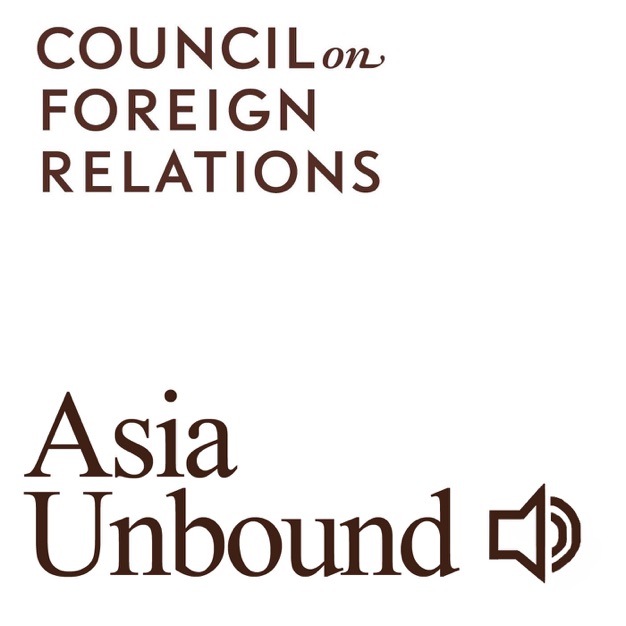 Asia Unbound
Asia Unbound
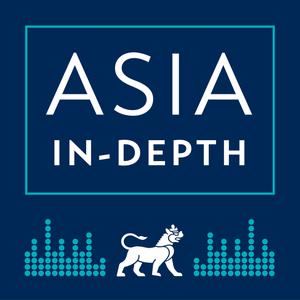 Asia In-Depth
Asia In-Depth
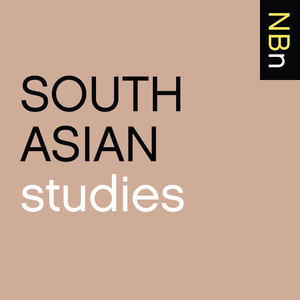 New Books in South Asian Studies
New Books in South Asian Studies
 China in the World
China in the World
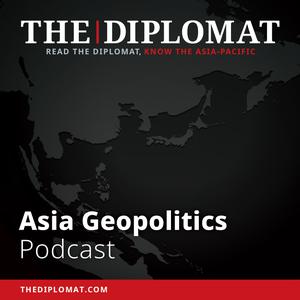 Asia Geopolitics
Asia Geopolitics